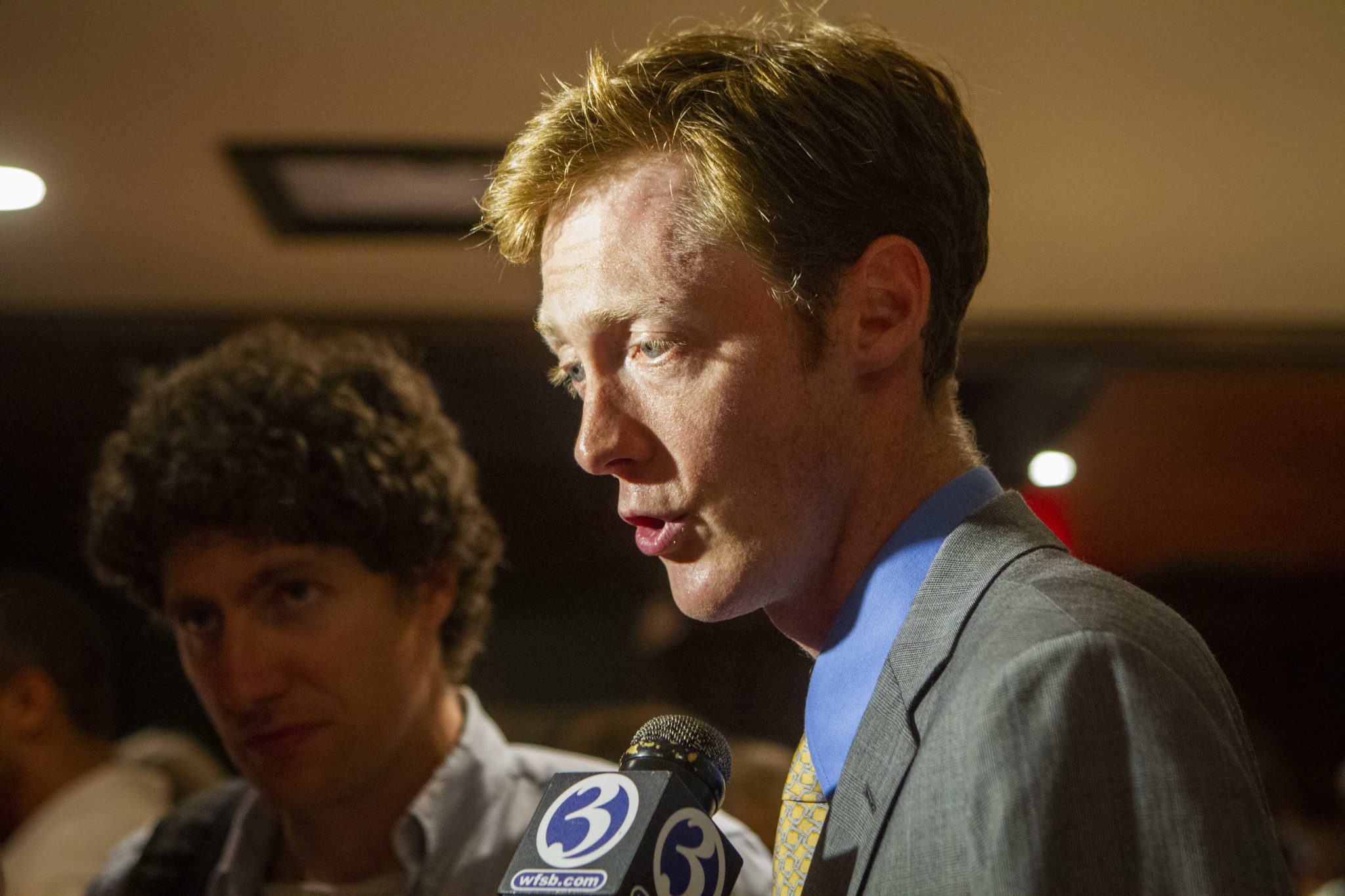
A little over five years ago, Mayor Toni Harp emerged victorious in a crowded field of Democratic candidates as she was elected to her first term at the helm of the Elm City. This Wednesday, one of her biggest challengers from 2013 became the first candidate to officially enter the 2019 mayoral race.
Justin Elicker FES ’10 SOM ’10, a former New Haven alder and current executive director of the New Haven Land Trust, entered the city clerk’s office just after business hours began on Wednesday to file the necessary paperwork to run as a Democrat in this year’s primary race for mayor. With his wife and two daughters by his side — one daughter in his arms — Elicker became the first person to officially throw his hat in the ring for this year’s race and set up what several New Haven news outlets have projected to be the most competitive mayor’s race since he and Harp last battled it out — six years ago.
In a press release, Elicker highlighted several reasons for running, noting that he wants to tackle issues such as increasing economic opportunity, improving living conditions and advocating fiscal responsibility.
“The prosperity we see physically manifested through Yale and Downtown hasn’t made it to our neighborhoods,” Elicker said in the press release. “I’m running for Mayor because I want my daughters to grow up in a city that provides everyone the education and opportunities they need to be successful in life.”
When Elicker last ran for the city’s top office, he represented Ward 10 on the Board of Alders. Ward 10 encompasses much of the affluent region of East Rock, as well as parts of low-income Cedar Hill. In his press release, Elicker highlighted New Haven’s potential but also noted its increasing inequality. He underscored his own “commitment to lifting all New Haven’s communities together.”
On Wednesday, after Elicker filed his run, Harp told the New Haven Independent that she expects to run for a fourth two-year term, setting up what is likely to be a competitive race after she cruised to reelection in both 2015 and 2017. In 2017, Harp won 73 percent of the vote in the general election. Then, she faced two challengers, Working Families Party candidate Sarah Ganong and unaffiliated candidate Marcus Paca, who both stopped actively campaigning by the general election. Paca originally ran as a Democrat but lost the primary election by a nearly three-to-one margin.
Harp’s office did not immediately respond to requests for comment.
Elicker’s entry into the race comes as Harp, who will be a three-time incumbent highly backed by the city’s powerful unions, has recently fallen under tighter scrutiny. Although New Haven’s fiscal woes did not begin with the Harp administration, City Hall’s financial struggles have come to a head.
Connecticut’s major municipalities have struggled with deficits for years, and New Haven is no different. City Hall has yet to effectively manage cutting costs like fire and police overtime. Meanwhile, the city has avoided bankruptcy in the short term through measures such as an unpopular 11 percent property tax hike and the Elm City’s largest debt refinancing.
In 2013, Elicker and Harp were two of several candidates vying to assume the position vacated by former mayor John DeStefano Jr. who spent two decades in City Hall’s highest office.
Despite Elicker’s loss, his 2013 campaign surpassed early expectations. He was a relative political newcomer at the time — he moved to the Elm City to attend graduate school at Yale and was only 38 years old in an experienced primary field. Harp, however, had represented New Haven for 20 years in the Connecticut State Senate and, prior to that, had served as an alder for five.
When Harp won the 2013 Democratic primary, Elicker decided to run as an independent to challenge her in the general election, where there was no Republican candidate. In the final vote count, Harp defeated Elicker by 55 to 45 percent of the vote — the margin of victory was around 2,000 ballots.
In 2013, Elicker partook in the Democracy Fund — part of the public financing system —and intends to do so again, filing that application shortly after the City Hall paperwork. Usually, voters are legally allowed to make up to $1000 in donations to a candidate. For candidates who participate in the Democracy Fund, among other stipulations, that limit is lowered to $370, and candidates cannot accept money from Political Action Committees. Harp has never participated in the Democracy Fund.
Elicker has served as the executive director of the New Haven Land Trust since 2014, when he took the reins of the organization after it faced an embezzlement scandal. Elicker’s wife, Natalie Elicker, is an assistant U.S. attorney based in New Haven. Neither Elicker nor his press contact could be immediately reached for comment.
Elicker earned master’s degrees in business administration and environmental management from Yale’s School of Management and School of Forestry & Environmental Studies, respectively, in 2010.
Angela Xiao | angela.xiao@yale.edu







